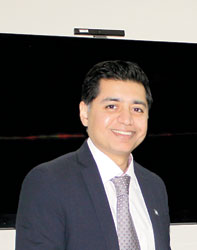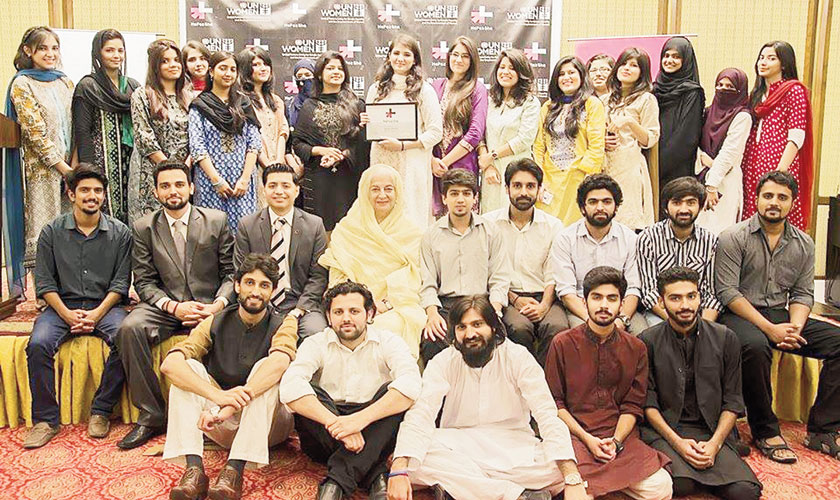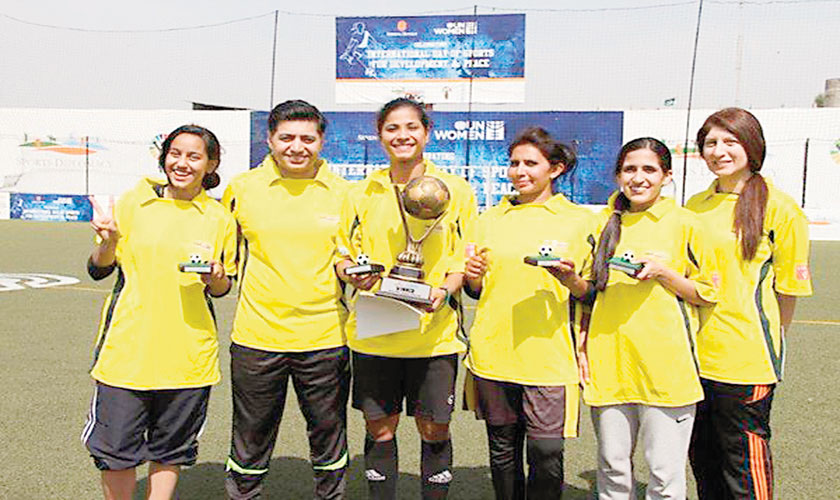In an exclusive interview with You! UN Women’s Country Representative Jamshed M. Kazi talks about the changing role of women in Pakistan...
 In an exclusive interview
In an exclusive interview
with You! UN Women’s Country Representative Jamshed M. Kazi talks about the changing role of women in Pakistan...
Originally from Bangladesh, Jamshed M. Kazi holds Master’s degrees in Public Administration; Development Studies; Environmental Assessment from the Kennedy School of Government at Harvard University and the London School of Economics. He also holds a Bachelor’s degree in Geography and International Development.
Kazi served as the director of UNDP’s Global Policy in Norway; he also worked at the IUCN - The World Conservation Union - in Karachi in the late 1990s. And he also worked as the global Practice Manager of the Democratic Governance at UNDP headquarters in in 2010 to 2014. He was also attached with UNDP in Ethiopia and Lao PDR, UNESCAP, UNEP. Currently he is serving as the Country Representative of UN Women, Pakistan. Here are the excerpts from Jamshed M. Kazi’s exclusive interview...
You! When and why was the UN Women made?
Jamshed M. Kazi: Over many decades, the UN has made notable progress in advancing gender equality globally, including landmark agreements such as the Beijing Declaration and Platform for Action and the Convention on the Elimination of All Forms of Discrimination against Women (CEDAW). Women lack access to decent work and face occupational segregation and gender wage gaps. They are too often denied access to basic education and health care. They are under-represented in political and economic decision-making processes. For many years, the UN has faced serious challenges in its efforts to promote gender equality globally. With the formidable support of civil society partners and many countries around the world including Pakistan, UN Women was thus created as a full-fledged entity of the UN family in July 2010 to address such challenges.
You! What is UN Women’s goal?
J.M.K: The goal is to enhance, but not replace the efforts by other parts of the UN system such as UNICEF, UNDP, ILO and UNFPA, all of which will continue to work for gender equality and women’s empowerment in their areas of expertise.
You! A man heading a women’s organization, was this intentional?
J.M.K: I often get this question! Actually it is a reflection of just how deeply entrenched our gender biases are. I believe, men or women should not be confined to certain professions.
I am not a unique specimen since I am one of ten male UN Women Representatives around the world out of a total of 90 (the other 80 are women). You might have heard about UN Women’s popular global campaign called ‘HeforShe’, which is about engaging boys and men to be part of the struggle for gender equality and the empowerment of women. I hope my presence here in Pakistan affords me greater opportunity, access and ability to influence men, to make women and girls realize their full potential and claiming their legitimate rights guaranteed by the Constitution.

Jamshed M. Kazi with UET students, championing the HeforShe Movement in Lahore
You! What goals have UN Women set specifically for Pakistan?
J.M.K: UN Women Pakistan works closely with women and youth by amplifying their voice and agency in strengthening their participation, representation, and leadership in planning and decision-making processes at all levels. Through our provincial and local level presence, we will ensure women’s needs and priorities continue to be addressed, using a programmatic approach with strengthened monitoring mechanisms and at the same time will strengthen linkages with the national level institutions.
You! What have you achieved so far?
J.M.K: Over the past years the UN Women Pakistan Office has emerged as a trusted and a reliable development partner, in assisting the Government of Pakistan at all tiers. There is also a growing recognition of UN Women’s agenda amongst urban youth and academia through its recent initiatives in promoting the ‘HeForShe’ and ‘UNiTE to end Violence against Women and Girls’ campaigns.
Also, for the first time in Pakistan landless women farmers and sharecroppers in Sindh received land tenancy rights under one of our projects. We have also supported a number of initiatives that increased women’s mobility, and combatted street harassment and other forms of violence in public spaces for women and girls, such as ‘WoW- Women on Wheels’ in Lahore and Faisalabad.
You! How do you plan to tackle the issues - rape, violence, health, education - faced by Pakistani women?
J.M.K: We are working on multiple interventions undertaken in parallel to have long-lasting and permanent effects - (i) Adoption, implementation and monitoring on direct (and indirect) legislation that recognizes and criminalizes violence and discrimination against women and girls; (ii) Bridging the gap between law and practice; (iii) Improving response and protection services for survivors through shelters, hotlines and ‘one-stop’ Violence Against Women Centres; (iv) Community campaigns combined with community outreach to build a new norm supportive of intervening to end discrimination against women and girls in all spheres of life.
You! How can women contribute to the economy?
J.M.K: Women in Pakistan are 10 times more involved in unpaid care work than men. Their engagement in the care work (domestic chores) is not recognized in the country’s GDP. Majority of women from poor households are also involved in the agricultural field work. There are a number of women who are home-based workers. They are devoid of medical facilities and other fringe benefits. If the government recognizes by adopting and implementing relevant policies and legislations in all provinces, majority of women will start receiving decent income to make both ends meet.
You! What does UN Women have in mind to bring the working women into the main labour force?
J.M.K: UN Women is supporting the national and provincial governments in adopting policies and laws on informal workers especially on home based workers that constitute a major category within the informal workforce. Once the informal women workers are recognised as formal workers, they will be entitled to social security benefits and they can demand decent wages for their work. Women farmers get paid very less as compared to men. Studies show that contributing family workers’ work is valued at 10.4% of Pakistan’s GDP. Sindh is the only province that has passed a legislation to allow agricultural workers to access social security including health benefits. Other provinces should follow suit and ensure protection of rural women’s rights.
You! How can you get men on board to raise their voices for women?
J.M.K: We need to first start with getting men to be much better at listening and then taking action. UN Women’s global Goodwill Ambassador, Emma Watson while launching the ‘HeforShe’ campaign, remarked that the more she spoke about feminism, the more she realized that fighting for women’s rights too often became synonymous with male bashing.

Jamshed M. Kazi with the National Football Team
You! Do you think the presence of a larger number of women in our Parliament has made a difference?
J.M.K: The key is not the presence of a large number of women in Parliament but the substantive collective efforts of all Parliamentarians - both men and women - to draft/review, adopt, implement and monitor pro-women legislation and policies.
You! Is UN Women working for KP, Balochistan & Sindh?
J.M.K: UN Women is actively working in all provinces and regions of Pakistan. Projects for 2016 and beyond will address: rule of law; access to justice, services and safe spaces for women; women friendly transport; income generation and security through decent work and empowering women through information technology.
You! How can women be made to raise their voices against crimes against them?
J.M.K: For an effective respons, governments must review national/local legislation, customs and abolish those that discriminate against women. When it comes to the prosecution of offenders, we know that ending impunity means that laws must be enforced. Women must have access to the police to file a criminal report and receive legal advice and protection orders. The response to violence must be immediate, coordinated and effective so that crimes are punished and justice is secured. If we really want women to be able to confidently raise their voices against crimes then we must promote a culture of equality between men and women through institutional and legal reform, education, awareness-raising and the full engagement of men and boys.
You! How can we make women an important element of this social fabric?
J.M.K: When we empower women, we develop nations; but women cannot do it alone. Everyone has a critical role in ensuring accountability for the realization of women’s rights - social, economic, legal and political rights. We know there are major gaps, but it is not unachievable. Let us together ‘Step It Up for Gender Equality’ and achieve a ‘Planet 50-50 by 2030’ where all women and girls have equal opportunities and rights.